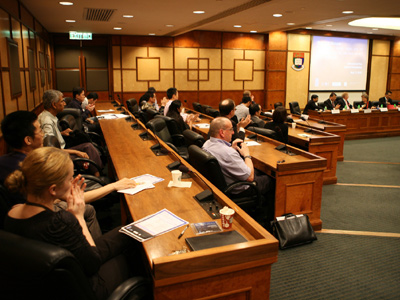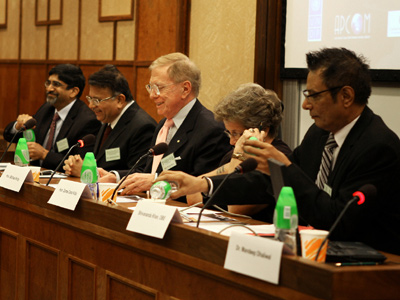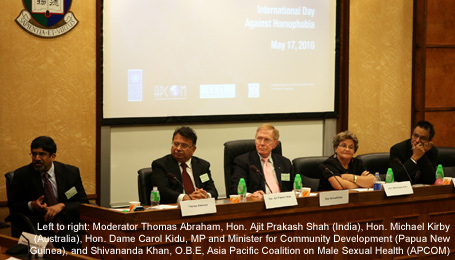*Updated with list of countries on May 24, 11pm +8GMT
On May 17 a panel of high-ranking judges, lawmakers, researchers and community activists gathered at the University of Hong Kong to discuss legal reform and how active participation from the community can help reverse an alarming trend where more than 90 percent of men who have sex with men (MSM) in the Asia-Pacific region do not have access to HIV prevention and care services.
This warning was highlighted during a high-level dialogue entitled “Punitive laws, human rights and HIV prevention among men who have sex with men in Asia Pacific” organised by the United Nations Development Program (UNDP) in association with the Asia-Pacific Coalition on Male Sexual Health (ACPOM) and the Center for Comparative and Public Law (CCPL) at the Faculty of Law, The University of Hong Kong.
Research conducted by UNDP and APCOM over the last 12 months investigated the affect that legislation, the judiciary and law enforcement has on responses to the HIV epidemic across the Asia-Pacific region.
While the final report is to be tabled later this year, preliminary findings were released to coincide with the International Day Against Homophobia (IDAHO).
John Godwin, a consultant to the UNDP, elaborated on data which demonstrates the precarious position of the Asia-Pacific’s HIV response. In its report, the UNDP believes the already critical situation is “likely to get worse” if countries fail to act.
Nineteen out of 48 countries across the Asia-Pacific region criminalise consensual male-to-male sex. [*Male-to-male sex is illegal in Afghanistan, Bangladesh, Bhutan, Maldives, Pakistan, Sri Lanka, Brunei, Malaysia, Myanmar, Singapore, Cook Islands, Samoa, Tonga, Tuvalu, Papua New Guinea, Solomon Islands, Kiribati, Naura and Palau. Sex between adult males was decriminalised in India's National Capital Territory but Supreme Court proceedings are still pending and the application to other jurisdictions has not been determined.] Of these 19 countries, 16 are former British territories where anti-sodomy laws were introduced during colonisation. Despite the ascension to independence by all 16 countries, this remnant of colonialism remains in their penal codes.
Godwin described the disconnect that exists between national AIDS policies and legal frameworks in many countries. He cited how legislation often runs counter-productive to HIV prevention strategies implemented by health officials. This legal gridlock was compounded in some cases where selective enforcement of public order and prostitution laws hamper fundamental outreach activities such as safer sex campaigns and condom distribution.

“Why do people hate homosexuals?”
In an attempt to unravel the reasons behind the disconnect between public health policy and legislation, the Honourable Michael Kirby, former High Court Judge of Australia, posed the question to the audience point-blank: “Why do people hate homosexuals?”
Kirby’s analysis of this subject revealed how the human element has often been at odds with science. Evidence-based, scientific research is the cornerstone of any public health policy. In contrast, Kirby recounted with dismay the number of instances through history where proposed legal reforms, designed to support health policy, had been put down due to talk of “Sodom and Gomorra” and other religious metaphors entering public debates.
Kirby noted, however, that there is progress on the legal front coming from recent court decisions in India, Pakistan and the Philippines on issues of sexual orientation or gender identity. However more work and leadership, by the likes of countries like Hong Kong – who repealed their anti-sodomy laws in 1991 – is required.
Landmark decision by the Delhi High Court
The Chief Justice who presided over the court in Delhi, India was on hand to describe the turn of events that led to a landmark decision in July 2009. The Honourable Ajit Prakash Shah, explained the social impact of his ruling that Section 377 of India’s Penal Code was discriminatory and “a violation of fundamental rights”. He said the case began a “national conversation” with LGBT issues now firmly “out of the closet”, a scenario he described necessary and beneficial.
While pointing out that the loudest voices against the ruling are coming from religious groups, Shah drew attention to a handful of faith-based leaders who have come to support the decision. These pro-repeal religious figures, although modest in number, refer to the constitution as being paramount and acknowledge that the goal of any religion was to develop of an inclusive society that isolates no one.
In addressing issues of “morality” – a contentious issue often at the epicentre of legal debates on LGBT rights issues – the Indian court said governments should "not be guided by public morality, but by constitutional morality", Shah recalled. He went further to explain that by repealing Section 377, the court helped resolve an impasse for the Ministry of Health whose national HIV prevention program had been obstructed by the laws of the land.
While courtroom dramas and landmark judicial rulings provide fireworks which catch worldwide media attention, the long and arduous road to legal reform via the legislative process is often less publicised, but no less significant. The governmental route requires extraordinary effort, as was characterised by a lawmaker who presented her experience over the past 10 years in Papua New Guinea.

Left to right: Moderator Thomas Abraham, Hon. Ajit Prakash Shah (India),
Hon. Michael Kirby (Australia), Hon. Dame Carol Kidu, MP and
Minister for Community Development (Papua New Guinea), and
Shivananda Khan, O.B.E, Asia Pacific Coalition on Male Sexual Health (APCOM)
Papua New Guinea’s experience
The Hon. Dame Carol Kidu is Minister for Community Development in Papua New Guinea (PNG) and is the only woman member of the 109-member PNG Parliament. Kidu made no qualms in describing her campaign to have punitive laws against homosexuals reviewed in her country as a “rollercoaster ride, with some highs and many lows”. So turbulent has the journey been that Kidu admitted that she had recently considered ending her campaign, but was now reinvigorated after inspiration from the other panellists at the UNDP event.
Kidu’s mission is to correct the “hypocrisy of a situation” where “the criminality of homosexuality has remained, in spite of the fact that the technical criminals have become major players in PNG’s HIV response strategy”. Her submission to parliament points out that without effective measures to ensure safer sex practices, there is potential for a rapid increase in HIV infection among men who have sex with men, as well as the female sexual partners of bisexual men which are common in PNG.
Continued criminalisation of male-to-male sex does not stop it from occurring, Kidu explained, but instead, drives the practice further underground. These men become hidden and “difficult to engage in effective HIV prevention and care programs”. While Kidu was confident that her submission was based on sound evidence and acknowledges the sensitivities that exist among her fellow legislators, she hit a stumbling block in mid-May with progress on the current path now uncertain. Despite the recent setback Kidu, a strident advocate on issues of reproductive rights and sexual health, made it clear that several contingency plans are open for exploration.
Transforming talk into action
However the question remains: how can any of these UNDP-sponsored talks amount to significant change for gay men, bisexuals and transgender (TG) people, as well the wider LGBT community?
Dr. Mandeep Dhaliwal, a Team Leader at the UNDP’s Bureau of Development Policy in New York, explained that these findings and the pending report will be a guide to assist advocacy efforts in its 24 in-country offices throughout the Asia-Pacific region.
More to the point, Dr Dhaliwal was adamant that the report and events like these shed light on ideas and examples that can be applied in other countries.
This was illustrated by Shivananda Khan, Interim Chairperson of APCOM and founder of South Asia’s Naz Foundation International which is active on male-to-male sexuality and HIV in the region.
Khan spoke of a range of initiatives where lawmakers and law enforcers are becoming active players in educating the public. He spoke of plans in India where the government will embark on a campaign to destigmatise same-sex relationships. Khan noted several places where sensitisation programs for police officers have had encouraging success at reducing violence and abuses against MSM and TG. Further examples will be released in the final UNDP report to be tabled at the International AIDS Conference in Vienna this July.
The reality is that these things do not happen overnight, as Khan explained. He spoke at length that an active and passionate civil society that demands these initiatives is vital. Khan made it clear that action at government and justice level happens in countries where civil society “comes together and works together as a team, not against each, but with each other”. He made a call to the community to engage and build bridges with all sectors, including religious leaders.
A grim, yet common, thread between all speakers was tales of violence, police abuse, suicides in the face of public humiliation and spiralling HIV infection rates. Over time history has transformed these unfortunate events into catalysts for change in some countries. However the question left to attendees, and the community at large, is: how can significant change be won without further senseless loss of those whom we love.
Laurindo Garcia is a Manila-based correspondent and HIV Programs Manager for Fridae.












 列印版本
列印版本














讀者回應
xoxoxo
Saying like "tommyoch" that in those discriminating countries that "gays are left alone and HIV treaments are freely available for all " is totaly irresponsible and shows a very poor knowledge of the reality for sick gays in those countries.
We are still free to decide wether we want to visit such countries or not.
Oddly enough, the largest Muslim country in the world, Indonesia, no longer treats homosexual acts as crimes; two reasons I should say: democracy DOES exit in Indonesia ( forget its neighbours !) even though from time to time radicals are somewhat vocal, also, the Dutch were a bit less hypocrite than the Brits with regards to male-to-male sex (ref: E.M.Foster's 'Maurice').
Singapore very seldom enforces its anti-homosexual laws whereas Malaysia makes it a 'witch hunt'.
'We few, we happy few, we band of brothers' - Henry V, W.Shakespeare.
JP S
For sure I avoid visitting countries where being gay is criminal. Not because I am looking for gay bars or clubs but because I want my pink Sheqel (Israel currency) to be spend where people don't have homophobic criminal acts in thier laws.
I hope that gays in those countries will apeal to the UN and other human rights international organizations in order to get a support to change those discriminative acts.
Everyone has access to HIV prevention, it's called a condom, or don't stick it where it might cause you harm. Stick it up your ass is just an expression, you don't have to do it!
http://www.publicagenda.org/charts/countries-where-homosexuality-illegal
Sadly, SINGAPORE, a so-called cosmopolitan, westernized, modern, high-income city state still treat man-2-man sex as a crime although the government public states it will not "actively" prosecute any gay men indulging the act.
Also, many of these countries in the list have major muslim population.
It's ok if you do not care. But please don't suggest that UNDP and whoever else in charge of putting together this report leave out those countries because they aren't tourist hotspots or that residents in those countries don't find those laws as oppressive as residents in other countries with gay sex laws do.
Post #17: "Everyone has access to HIV prevention, it's called a condom, or don't stick it where it might cause you harm."
Of course, everyone is born with the knowledge that condoms can prevent HIV and they can get condoms easily from the cornerstore, supermarket, vending machine, etc. Seriously?
In my country, drug trafficking/possessing is death penalty, ya still people do it.
Laws, rules and policies are just for the bureaucratic minded people to make it - probably for profit and fun too.
Well, still will not stop most of us to go there for fun, work or stay there.
"Nineteen out of 48 countries across the Asia-Pacific region criminalise consensual male-to-male sex. [*Male-to-male sex is illegal in Afghanistan, Bangladesh, Bhutan, Maldives, Pakistan, Sri Lanka, Brunei, Malaysia, Myanmar, Singapore, Cook Islands, Samoa, Tonga, Tuvalu, Papua New Guinea, Solomon Islands, Kiribati, Naura and Palau. Sex between adult males was decriminalised in India's National Capital Territory but Supreme Court proceedings are still pending and the application to other jurisdictions has not been determined.] Of these 19 countries, 16 are former British territories where anti-sodomy laws were introduced during colonisation. Despite the ascension to independence by all 16 countries, this remnant of colonialism remains in their penal codes."
For instance here, in Malaysia it is more likely to be down to a simple fact that Islam is prevalent and no matter how well developed and prosperous country can become the law won't favor sexual activity between two men or two women. Not now not anytime soon.
In neighboring Singapore a single party PAP has ultimate dictatorship and guided by people with strong belief in Confucian concept of life.
The existing laws might cause serious implication to International efforts in containing/reducing HIV/AIDS pandemic in the region.
But to be frank- is never a serious issue in any personal or business affairs. Every civil institution and authority has gay people "inside" and every capital has it's gay scene.
Happy gay life is possible even under existing law. As long as you don't take a p1ss you can live, love, sin etc.
@.O
anyway,
i think all this useless...
people will just do it.....
請先登入再使用此功能。